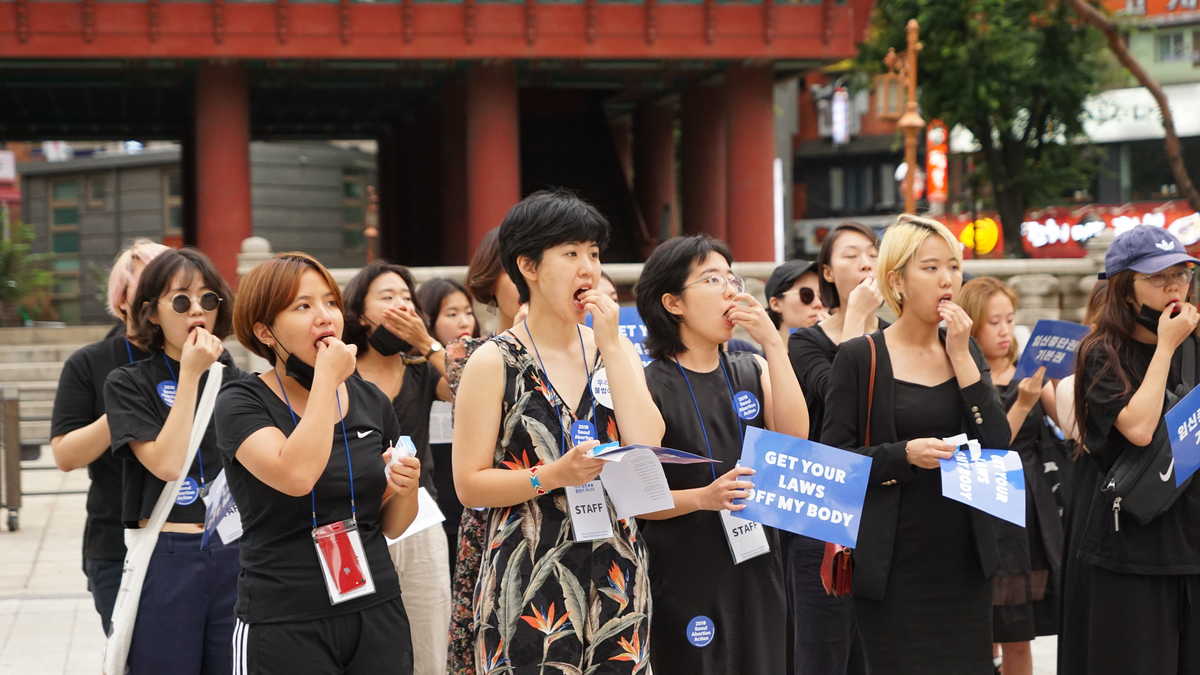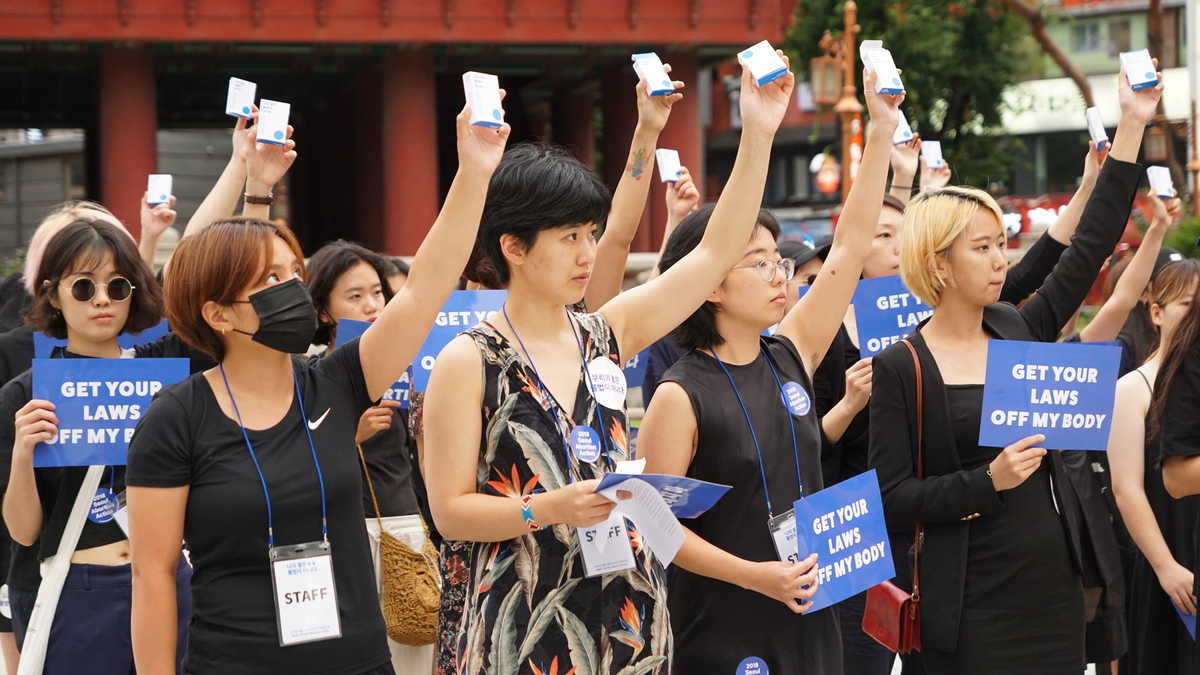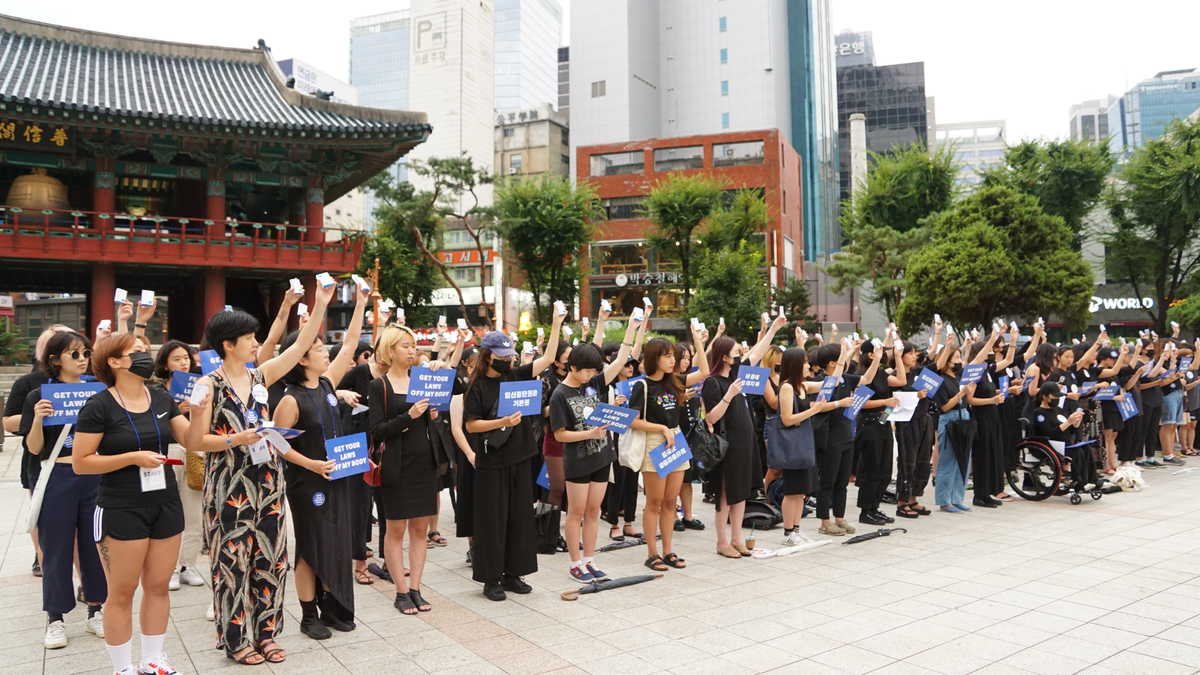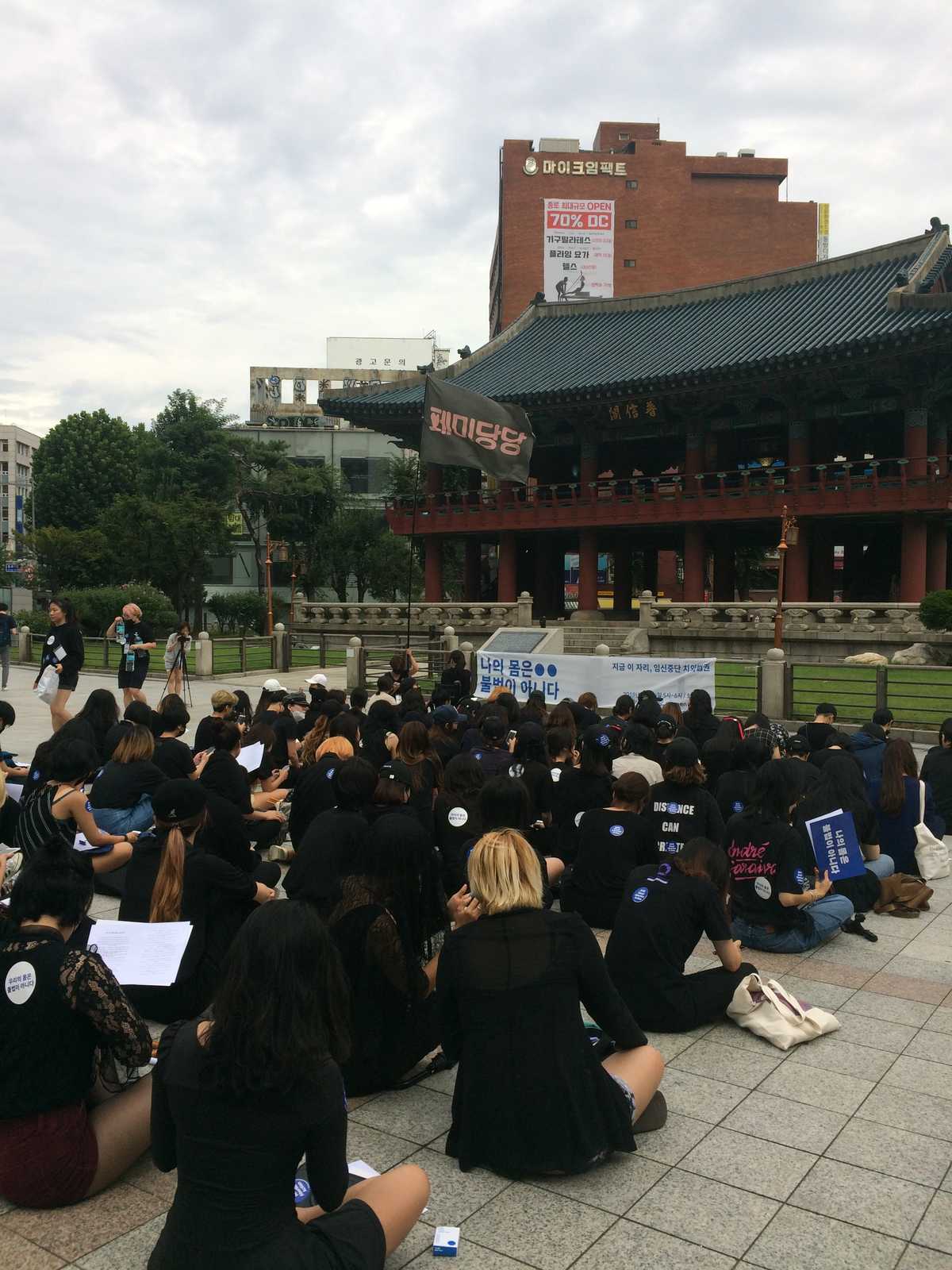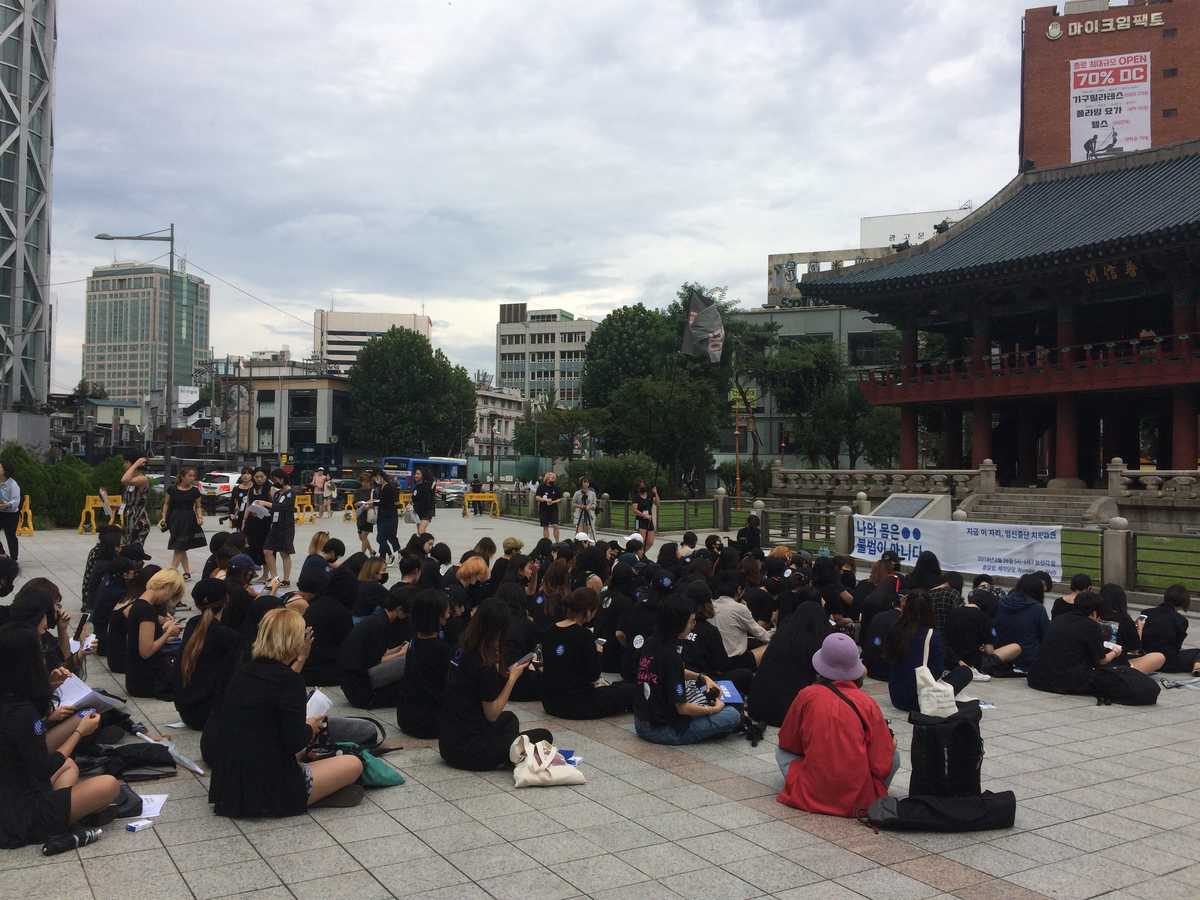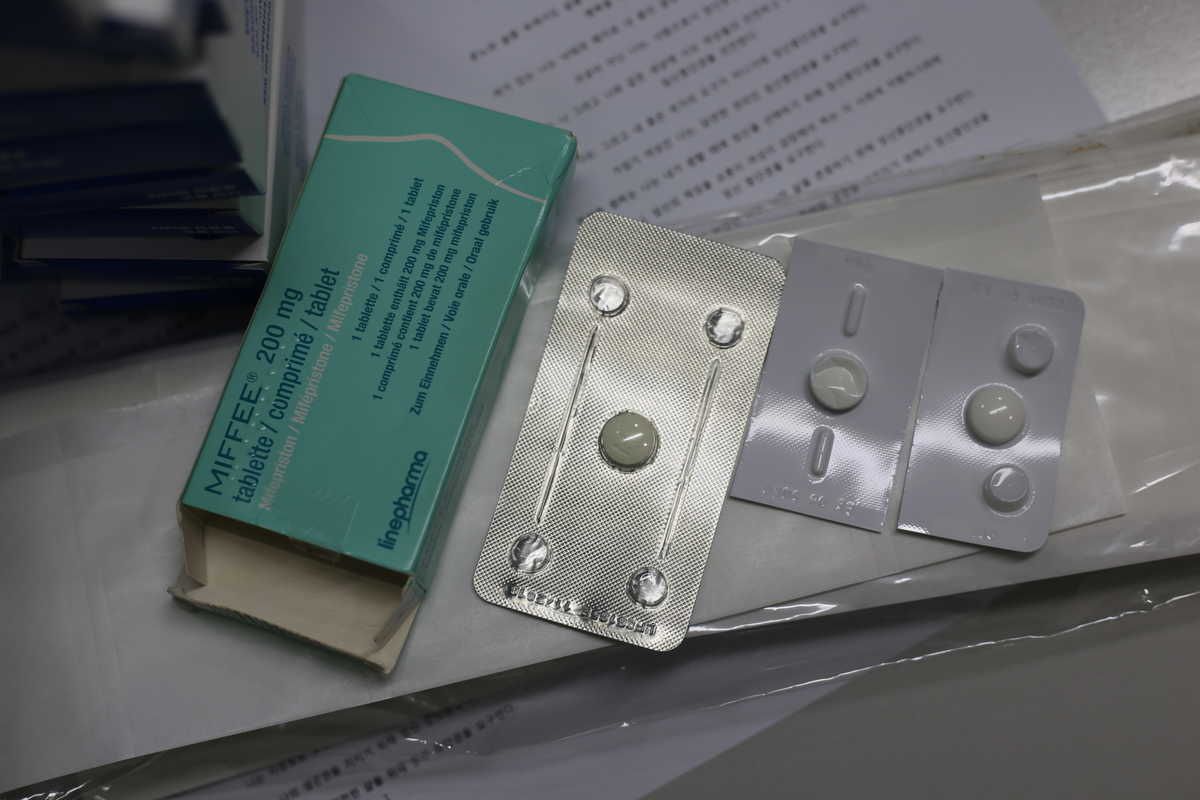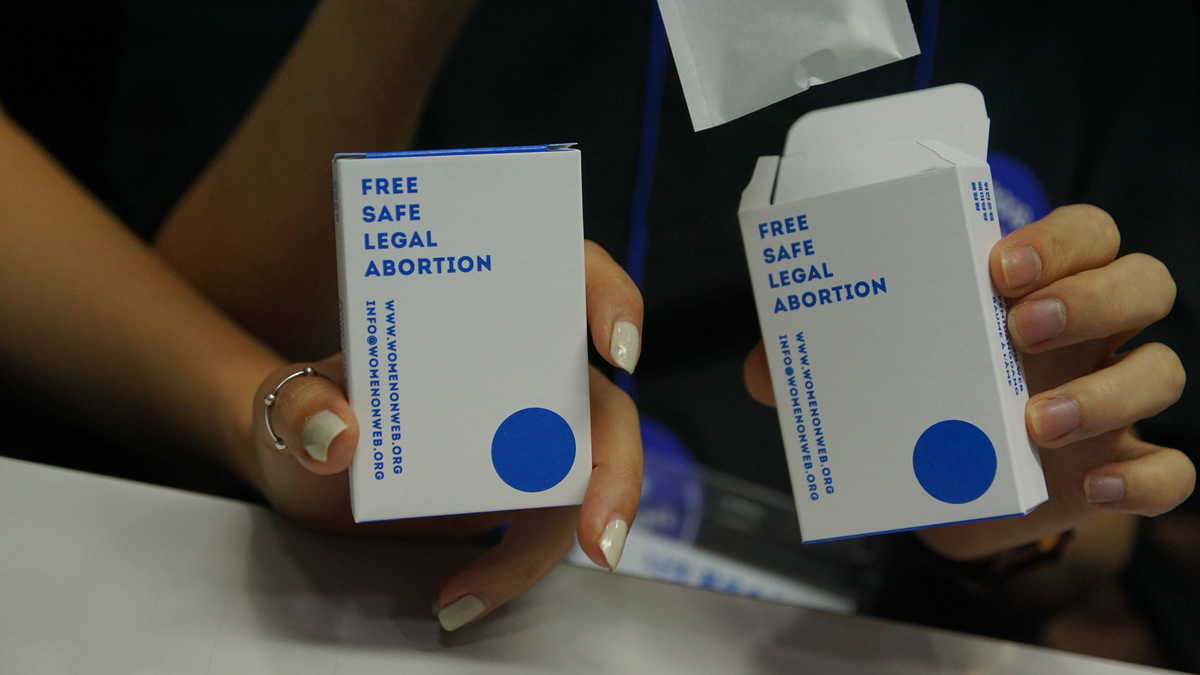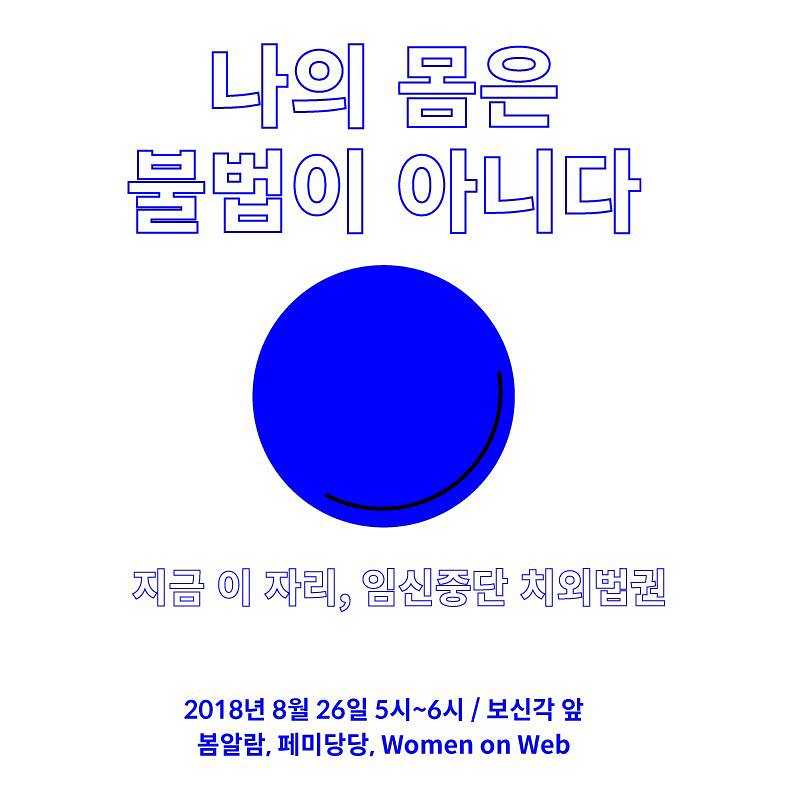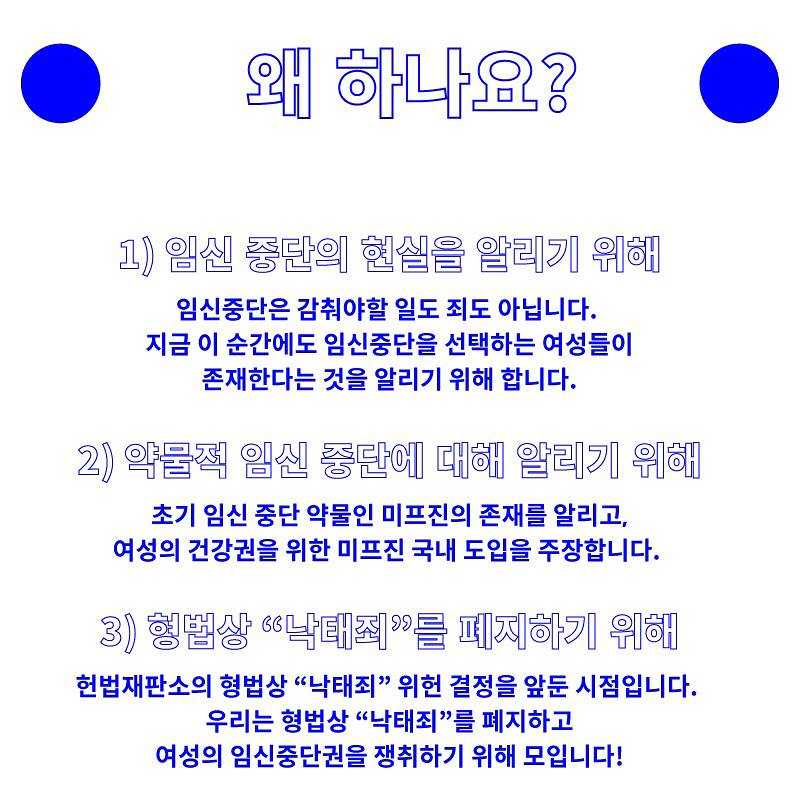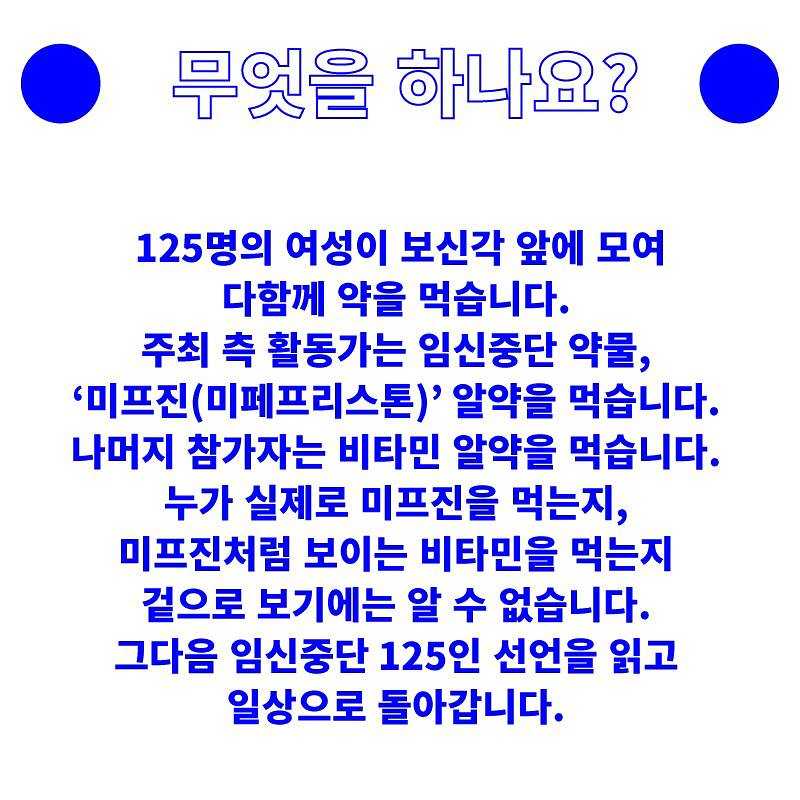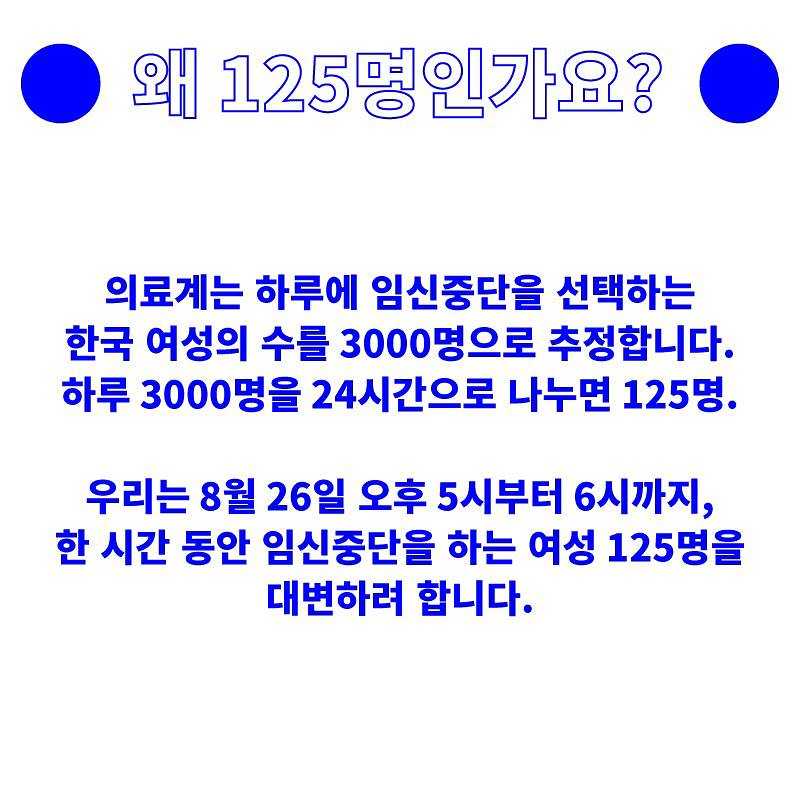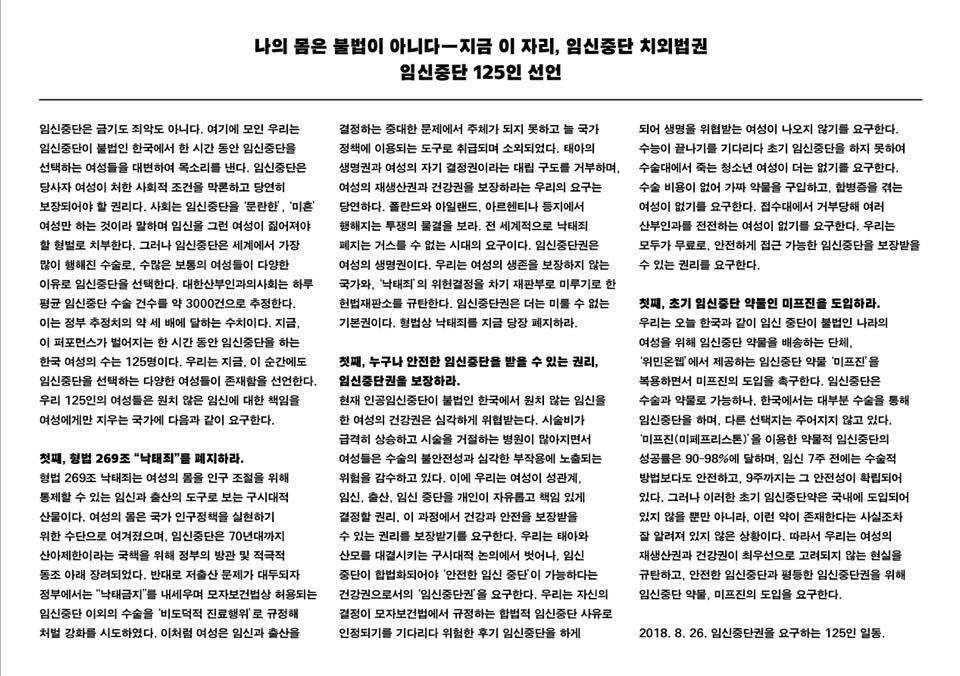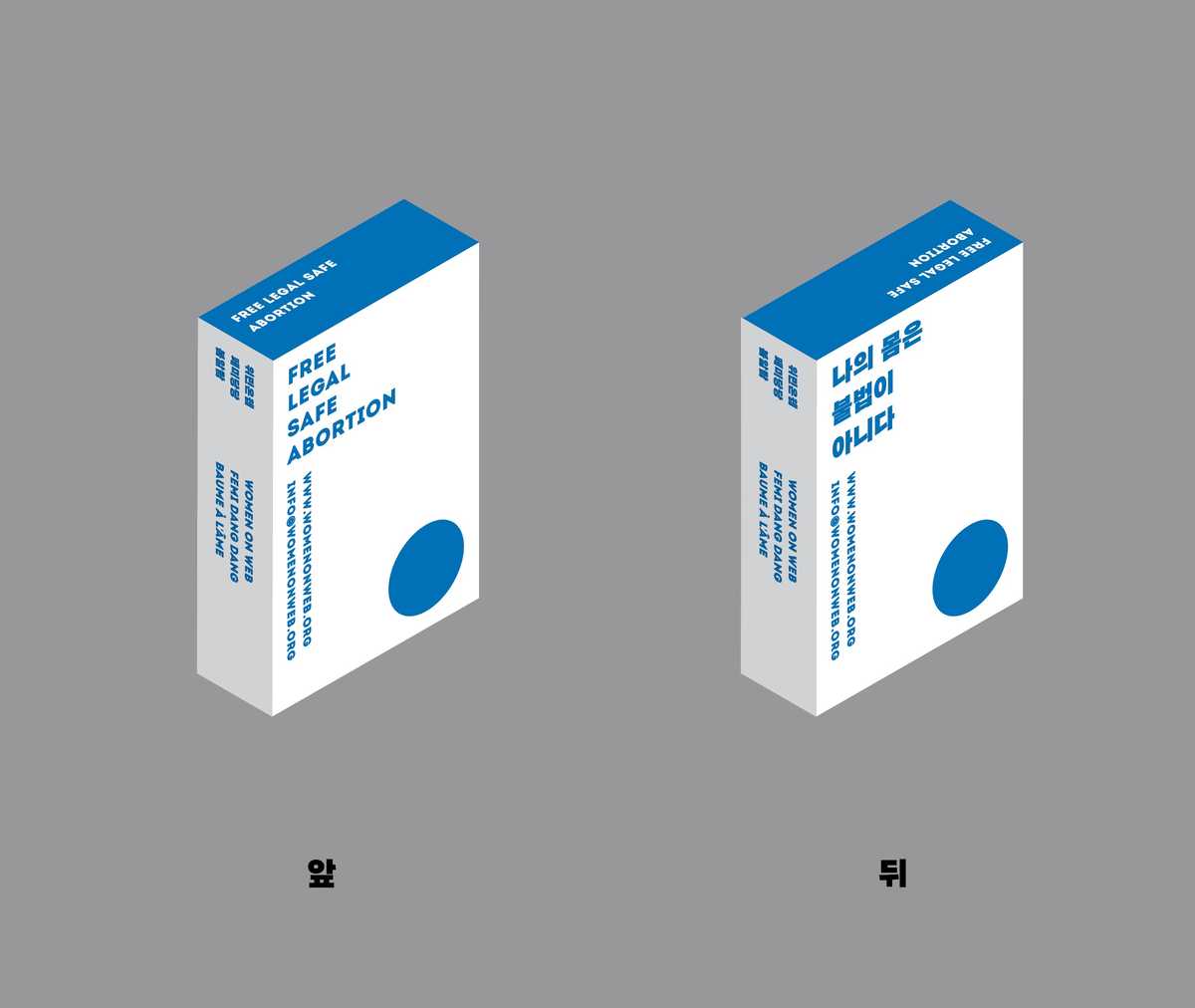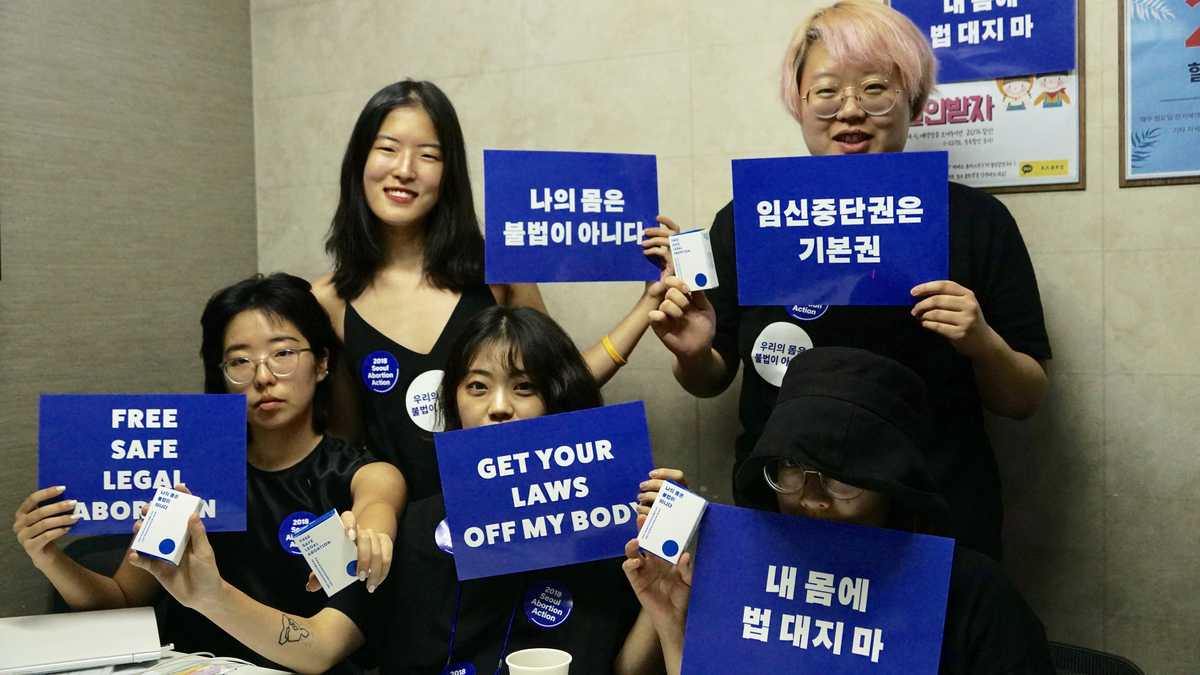Abortion Pill Protest in Seoul, South Korea 2018
For immediate release:
26-8-2018: Today 125 women swallowed the abortion pill in defiance of the restrictive abortion laws in South Korea. Even though abortion is illegal, every hour 125 women have an abortion in South Korea. The protest took place in front of Boshingak in the center of Seoul. It was organised by the Korean feminist organisations Femidangdang and Baumealame, in collaboration with Women on Waves and Women on Web. The facebook post announcing the action and calling for mobilisation was censored by Facebook and removed.
For more information please contact:
Femidangdang: email femidangdang@gmail.com
https://www.facebook.com/femidangdang/
Baumealame: https://www.facebook.com/baumealame/
Abortion Declaration by 125 women
My Body Is Not Illegal
Right here, right now – extraterritorial termination of abortion
Terminating a pregnancy is not a sin. It is not taboo. Right here in South Korea, where abortion is prohibited by law, we speak for women choosing to terminate pregnancies. Abortion is a right that must be secured no matter the social status of the woman. Society speaks of abortion as a decision that only promiscuous or unmarried women choose. Pregnancy is considered a just punishment that such women must bear. However, abortion is an operation that is most frequently enacted worldwide, and many women choose abortion for various reasons. According to the Korean Association of Obstetricians & Gynecologists, it is estimated that around 3000 surgical abortions are conducted within our country every day. This is three times the amount our government estimates. During the single hour that our performance is taking place, 125 South Korean women decide to terminate their pregnancy. Right at this moment, we speak of the women that choose abortion. 125 of us have come together to make the following demands to a country that imposes the responsibility of unwanted pregnancies upon women, and women only.
We demand for the abolition of Clause 269 of Criminal Law.
Clause 269 is the result of an outdated effort for control over women’s bodies for population control. Our bodies have been considered a means for the realization of population policies. Until the 70s abortion was actively encouraged and promoted by a government that wanted to enforce birth control. As the lowered birthrate became problematic the government decided to legislate against abortion. Any surgical abortion practices other than the few instances allowed by the Mother and Child Health Law were ruled “immoral medical practice”, and penalties were strengthened. As such recent history shows, the voices of women have been sidelined in the decision-making process of pregnancy and childbirth. Regarded as instruments of government policies, women have been alienated from the conversation entirely, stripped of all autonomy. We reject the binary opposition of ‘life’ and ‘choice’. Our reproductive and health rights must be secured. Consider the movements across countries such as Poland, Ireland and Argentina. The abolition of anti-abortion legislation is a demand shared worldwide and cannot be silenced. We denounce the Constitutional Court that decided to postpone judgment of the unconstitutional criminalization of abortion. Abortion rights are basic human rights. All legislation that criminalizes abortion must be abolished.
We demand the right to safe abortion procedures for all
In a country that prohibits abortion women’s health rights are severely threatened. While costs for surgical abortion increase drastically, an increasing number of institutions refuse to perform the procedure. Women are exposed to dangerous circumstances and life-threatening complications. We demand for the right to choose freely and independently in the matters of sex, pregnancy, childbirth and abortion. We demand that all processes involved are guaranteed to be safe and unharmful. We demand that the discussion evolves from its outdated status – one that situates a binary conflict between child and mother. We ask for the right to abortion as one that locates within the realm of health rights. Abortion must be legalized to ensure safe processes and surgical procedures are available. We demand that no more women are threatened by the dangers of terminating a late-term pregnancy, as they wait for their request to be acknowledged under the limiting Mother and Child Health Law. We demand that no more young women end their lives on an operating table. We demand that no more women, who cannot pay for surgical procedures, endanger their own health by purchasing unverified medication that often lead to hazardous side effects. We demand that no more women are rejected by countless hospitals, turned away by every front desk. We demand the right to abortion procedures that are safe, free and accessible for all.
We demand the introduction of mifepristone, for the medical termination of pregnancy.
Today we take a single mifepristone pill together for all the women in countries that prohibit abortion like ours. We have been sent the medication by ‘Women on Web’, an organization that works to provide all women with abortion medication. Abortion can be surgical or medical, but in South Korea the latter is not an alternative. Medical termination of pregnancy through mifepristone has a success rate of 90 to 98%. Mifepristone is not available in South Korea. Many do not even know that such medication exists. We denounce this reality where the reproductive health rights of women are not under consideration and demand the proper introduction of mifepristone to guarantee an option that is safe and accessible to all.
Signed by the 125 women gathered in Seoul on the 26th of August, 2018.
Background information
South Korea:
Abortion is illegal in South Korea in most circumstances. A pregnant woman inducing her own miscarriage or any person performing an abortion is subject to imprisonment for one year or a fine. The penalties for medical personnel are increased to imprisonment for up to two years.
According to the Korean Association of Obstetricians & Gynecologists, it is estimated that around 3000 surgical abortions are conducted within our country every day. This is three times the amount our government estimates.
The Supreme court is expected to decide about the legalisation of abortion later this year.
Abortion is one of the most performed medical interventions in the world. An estimated 56 million induced abortions occurred each year worldwide. Globally, 25% of all pregnancies end in abortion.
Abortion is legal in most countries of the world such as the United States, Canada, India, Russia, China and almost all European countries.
The restriction of abortion services creates social inequality as traveling to another country where abortion is allowed or getting a safe underground abortion provided by a doctor are very expensive. This means that women with access to financial means and information will always be able to access safe abortion services and women without the financial resources are most affected by restrictive abortion laws. By restricting access to safe abortion, countries violate women’s rights especially Article 25 of the United Nations' Universal Declaration of Human Rights states that "Everyone has the right to a standard of living adequate for the health and well-being of himself and of his family, including food, clothing, housing and medical care and necessary social services."
Abortion pills
The medicines used for a medical abortion, mifepristone and misoprostol, have been on the list of essential medicines of the WHO since 2005 and are available in almost all European countries, USA, Russia, China, Australia and Canada.
Scientific research by the World Health Organisation has shown that medical abortion can easily be done by women themselves at home. A medical abortion has the same health impact as a spontaneous miscarriage. The risk of an abortion with medicines are similar to the risks of commonly prescribed medicines and over the counter medication such as antibiotics and some painkillers. An abortion with pills is much safer than childbirth and safer than plastic surgery.
Women on Web online abortion service
Women on Web, a non for profit telemedical abortion service started operations in 2006. Women on Web (www.womenonweb.org) is a telemedicine abortion service that supports women in countries where there are no safe abortion services, to get access to safe medical abortion with mifepristone and misoprostol. Its aim is to reduce maternal mortality and improve reproductive health and rights.
Through the website women can do an online consultation, which is reviewed by a doctor. If there are no contraindications, women can receive the abortion pills at their home address through mail.
Several scientific studies in the outcome of the abortions and the experiences of women using the Women on Web service have proven the telemedical service is very safe, very effective and highly acceptable for women.
The WHO also confirmed that abortions done with the help of Women on Web are considered safe abortions.
Media Abortion Pill Performance Seoul 2018
https://m.news.naver.com/read.nhn?mode=LSD&mid=sec&sid1=102&oid=001&…
I Demand Access to Abortion : Voices from 125 South Korean women
I demand access to abortion as a South Korean woman, to own and lead my life.
Netherlands: new law that allows the abortion pill by GP's, 2022
Finally in December 2022, the Dutch senate approved a new law that will allow…
Abortion Robot on Stage in Poland, 2018
December 2018,
On the invitation of director Maja Kleczewska and CHOTKOWSKI…
Abortion Robot in Belfast, Northern Ireland 2018
Operated from Amsterdam, the abortion robot successfully delivered abortion…
Abortion ship Mexico, April 2017
Women on Waves arrived in Ixtapa on April 19 th on the invitation of more than…
Abortion ship Guatemala, February 2017
In collaboration with women's rights organisations in Guatemala, the abortion…
Abortion drone Ireland, 2016
June 21 th, 2016. The Abortion Drone flew from the Republic of Ireland to…
First flight Abortion Drone, Poland 2015
The Abortion Drone was a success, women in Poland receive medical abortions.
Abortion ship Morocco 2012
MALI (alternative movement for individual liberties) invited Women on Waves to…
Safe Abortion Hotline Indonesia 2011
More than 130 people participate in flashmob in Jogjakarta to launch safe…
Abortion ship Spain 2008
Women on Waves visited Spain from October 16 till 21, 2008 at the invitation of…
Abortion ship Portugal 2004
The Women on Waves ship Borndiep stayed in international waters, 12 miles from…
Abortion ship Poland 2003
On June 16, 2003 Women on Waves set sail for Poland. We were invited by a…
Abortion ship Ireland 2001
On 11 June 2001, Women on Waves set sail from the Netherlands with an almost…
Safe Abortion Hotline Venezuela 2011
On May 18th, a safe abortion hotline was launched at the Nuevo Circo in Caracas
Misoprostol hotline Pakistan, 2010
A new hotline has been launched in Pakistan that gives information about how…
Safe abortion hotline Argentina July 2009
In Argentina abortion is illegal in most cases. There are about 500,000…
Safe abortion hotline Ecuador, June 2008
The Coordinadora Juvenil por la Equidad de Género (Youth Committee for Gender…
WoW at Creative Times in New York!
Women on Waves gave a presentation at Creative Times and participated in the…
Stir in Argentina 2004
On December 8, 2004, Rebecca Gomperts visited Argentina on the invitation of…
Introducing an international symbol
The essence of the-safety-pin campagne is to pull the themes abortion and…
Exhibition: I had an Abortion
I had an abortion. Poddalam sie aborcji. Jien ghamilt abort. Eu fiz um aborto.
Letter to Google concerning Restricting Advertisements that Promote Abortion Services
The Health Equity and Law Clinic of the University of Toronto wrote the…
